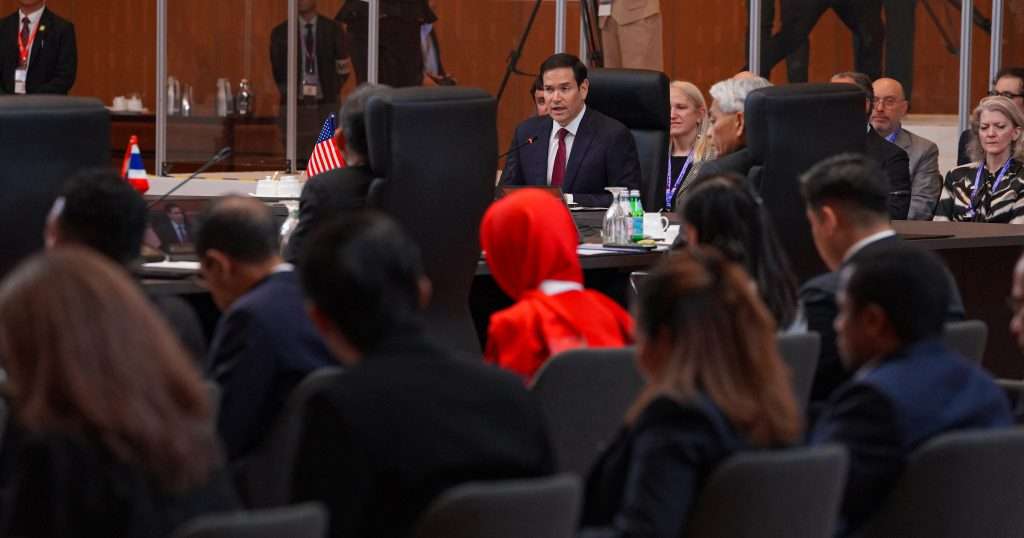Malaysia: US, China and Russia meet at ASEAN summit

Secretary Marco Rubio participates in the ASEAN-United States Post-Ministerial Conference in Kuala Lumpur, Malaysia, July 10, 2025. (Official State Department photo by Freddie Everett)
The US Secretary of State, Marco Rubio, along with the Foreign Minister of China, Wang Yi of China and the Russian Foreign Minister, Sergei Lavrov, concluded talks at an ASEAN foreign ministers’ summit held in Kuala Lumpur from July 10th to 11th, according to the The Associated Press. Both Rubio and Wang agreed at a bilateral talk on July 11th to explore “areas of potential cooperation” between Washington and Beijing while highlighting the need to effectively handle differences as they finished the two-day regional security conference in Malaysia.
The US and China attended the 58th annual Foreign Ministers’ Meetings of the Association of Southeast Asian Nations in Kuala Lumpur. Foreign ministers of ASEAN nations and representatives from Australia, Canada, the EU, India, Japan, the UK, New Zealand, Türkiye, South Korea and Russia were also present.
Increasing tensions loomed in the background between the two superpowers over trade, commerce, security, and particularly contentions over Taiwan, US trade tariffs, and China’s support for Russia’s war in Ukraine during the bilateral meeting.
“Look, we’re two big, powerful countries, and there are always going to be issues that we disagree on,” Rubio told reporters after the discussion. He added, “ I thought it was a very constructive, positive meeting and a lot of work to do,” saying that there needs to be better communication and trust between both sides.
Rubio hinted at a likely visit to China by US President Donald Trump to meet with his Chinese counterpart, Xi Jinping: “The odds are high. I think both sides want to see it happen.”
China’s Foreign Affairs Ministry issued a statement labelling the meeting as “positive, pragmatic and constructive” with Wang calling for increased bilateral cooperation. There was no mention of specific topics such as the escalating U.S trade war or the Russia-Ukraine war in the statement.
The discussion with Wang was held less than 24 hours after Rubio met the Russian Minister of Foreign Affairs, Sergey Lavrov, with Russia-Ukraine peace talks still at the table. Since former President Joe Biden was in office, Washington accuses China of providing support to Russia in expanding its military-industrial capacity to sustain Moscow’s war in Ukraine.
Secretary Rubio expressed that his administration agrees with this view. “I think the Chinese clearly have been supportive of the Russian effort,” he said. “They’ve been willing to help them as much as they can without getting caught.”
These meetings occurred amidst global and regional distrust in Southeast Asia over recent US policies, especially due to President Trump’s threats to impose a new round of tariffs on global allies and rivals. ASEAN leaders have voiced unease, but according to Rubio, many preferred to discuss security issues such as Chinese influence and cooperation with the US.
Rubio said that the issue was raised, though added, “But I wouldn’t say it solely defines our relationship with many of these countries”. He went on to state that there was great enthusiasm that the US was present at the summit.
Trump and the previous administration have made it clear that China is the US’s largest threat in technology, trade, and manufacturing. Washington has also been concerned over Beijing’s expanding global influence and its increased assertiveness in the Indo-Pacific, notably within the South China Sea and Taiwan.
A forum on China-Africa cooperation was held in June this year, aimed at strengthening trade partnerships, cooperation and investment opportunities between China and many African nations. Trump, meanwhile, threatened major tariffs on Chinese exports with little talks making progress until the August deadline.
The global powers hope to increase cooperation with regional players. The US just signed a civil-nuclear cooperation agreement with the summit’s host, Malaysia, while Wang denounced Trump’s potential tariffs and portrayed China as a stable country in talks with individual ASEAN nations. In separate meetings with Thailand and Cambodia, Wang outlined that the US has destabilised global trade and limited opportunities for economic development.
The EU and Australia stressed caution and diplomacy at the meeting, with Australia siding with Rubio’s call for a balanced Indo-Pacific and the EU advocating for a return to a stable trade system.
The Associated Press, Maghrebi.org
Want to chase the pulse of North Africa?
Subscribe to receive our FREE weekly PDF magazine











